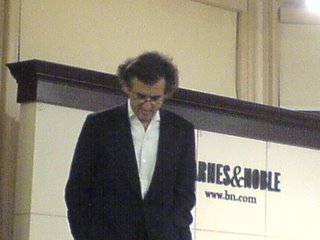Nice to see a couple of much more eloquent individuals, both of whom are very much "in the know" when it comes to the subject matter, pretty much agree with my last post (incidentally Zvi Zamir is actually portrayed in the movie by an Israeli actor):
'Munich' on their minds Jewish Standard Published 12/30/2005 Opinion Editorial
Don't confuse us with the facts.Yossi Melman and Steven Hartov
In 1984, the blood of the Israeli intelligence hunters and the Palestinian terrorists hunted in "the war of the spooks" was still congealing in the back alleys of Europe, when a young Israeli national named Yuval Aviv teamed up in a writing venture with a budding Canadian journalist named George Jonas. Aviv claimed to be a freshly defrocked Mossad assassin with a true tale to tell, and thus the game began.
The resulting best-seller was called "Vengeance," a detailed account of Israel's response to the Munich Olympic massacre of 1972. Seen through the eyes of Aviv's undercover persona,
"Avner," the tale seemed to marry well with the factual newspaper accounts of how Israel systematically eliminated the Black September killers of her athletes. At last, the book was made into a successful HBO film called "Sword of Gideon." Both Jonas and Aviv reaped substantial rewards for their "scoop."
Some years later, however, the truth about "Vengeance" was revealed in a Manhattan courtroom as Yuval Aviv was sued by a third party over royalties for the HBO film. From court documents and our own investigation, Aviv had never served in the Mossad, or in any other Israeli intelligence organization. He had failed early on during his basic training as an IDF commando, and his nearest approximation to "spy work" had been as a lowly gate guard for El Al airlines in New York in the early '70s. The tale he had woven for George Jonas was apparently nothing more than a Walter Mitty fabrication.
How then, did Steven Spielberg and his producer, Kathleen Kennedy, choose to once again bless Jonas and Aviv's tale by optioning it as the credited source for "Munich"?
Numerous offers to provide the production team with facts of the case were rebuffed. More than 30 years had passed since those early days of deadly cat and mouse (events that now seem quaint in comparison to the daily horrors of global war on terror), and participants on both sides were ready to talk. Yet the men who held the secrets were never approached. The phone never rang at the house of Zvi Zamir, who, as the former chief of Mossad, could have clarified the myths in a modest hour. Mike Harari, the former head of the Mossad department of operations who supervised Israel's hit teams at the time, did not receive a single inquiry from the Spielberg team. The families of the 11 murdered Israeli athletes were disappointed because they were not approached by the Spielberg people. Even Mohammed Daoud, the former Black September chief widely accepted as one of the Munich massacre masterminds, was dismayed that no one wanted to speak to him.
So far, the reactions to "Munich" have been predictable and essentially emotional. Some find it balanced, while others view it as overly sympathetic to one side or the other. Yet what we find most disturbing is that it is substantially a fiction that, given the influence of Hollywood cinema, may soon be regarded as a definitive historical account. The troubling question is whether there is an obligation to historical truth in a work of art that portrays real-life figures such as Israeli Prime Minister Golda Meir, using documentary footage to support its thesis. We believe that the answer is "yes."
Steven Spielberg is a man of great artistic power, and with that power comes responsibility. For a director who delivered such historical works as "Schindler's List," his behavior in this case resembles that of a cub journalist with a great story in hand, who chooses to run it rather than confuse us with the truth and facts.
Yossi Melman, a journalist specializing in intelligence affairs for the Israeli daily Ha'aretz, is co-author of the New York Times best-seller "Every Spy a Prince." Steven Hartov, the editor-in-chief of the quarterly Special Operations Report, is co-author of the New York Times best-seller "In the Company of Heroes.

 but one that I definitely appreciated. He said that there was one thing that was very unique to America, one thing that only one country in the world had done. He then stopped and said: no, sorry, two countries in the world share that uniqueness. He said there were two countries in the world that were formed not on the basis of a common birthplace or language, not on the bases of a common skin-colour or background, but based on a belief in a text, and he added, not necessarily religious. Those two countries are America...and Israel.
but one that I definitely appreciated. He said that there was one thing that was very unique to America, one thing that only one country in the world had done. He then stopped and said: no, sorry, two countries in the world share that uniqueness. He said there were two countries in the world that were formed not on the basis of a common birthplace or language, not on the bases of a common skin-colour or background, but based on a belief in a text, and he added, not necessarily religious. Those two countries are America...and Israel.







